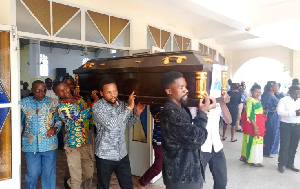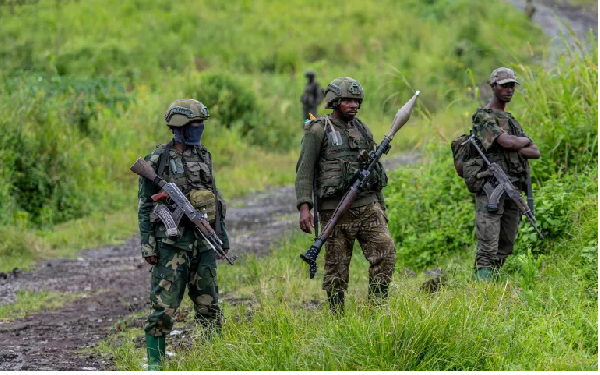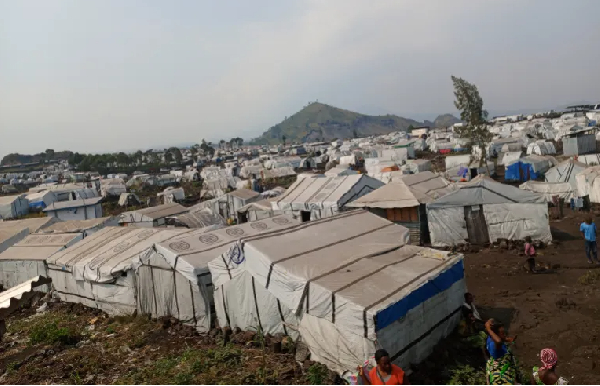 A funeral is held for a Congolese aid worker killed in an attack in North Kivu on June 30
A funeral is held for a Congolese aid worker killed in an attack in North Kivu on June 30
It was Sunday, June 30, two days after M23 rebels seized Kanyabayonga, a strategic city in Lubero territory in the Democratic Republic of the Congo’s North Kivu province.
After sunset, horrifying images began making the rounds on social media, showing the wreckage of unknown vehicles and the bodies of two people who were lynched, their bloodied faces making them difficult to identify.
Hours earlier, five vehicles carrying a dozen humanitarian workers had left Lubero territory for Beni, some 100km (60 miles) away, local sources told Al Jazeera. On the road, their convoy was attacked.
Two Congolese aid workers with Tearfund, a foreign NGO, were killed, the organisation said. Five cars and seven motorcycles were also set alight, civil society sources told Al Jazeera.
John Nzabanita Amahoro, 37, who had worked for the United Kingdom-based charity for 10 years as a water, sanitation, and hygiene technician, was among those killed.
His younger brother, Jean Claude Nzabanita, said his death has left a gaping hole in his heart.
“My brother was on a work assignment and had nothing to do with the war. I will never see him [again],” he told Al Jazeera.
The whole family had placed their hopes in Amahoro, who was the main breadwinner and the glue that bound the siblings together, he added.
“He cooperated with everyone, but those who killed him didn’t know that thousands of hopes had just been dashed,” he said, shedding tears.
170 security incidents
According to the United Nations Office for the Coordination of Humanitarian Affairs (OCHA), since the beginning of the year, more than 170 security incidents have directly targeted humanitarian workers in the DRC, causing at least four deaths and 20 injuries.
Violence in eastern DRC has been escalating since M23 rebels launched attacks against the Congolese army in late 2021.
Despite numerous calls for a ceasefire, the fighting persists with M23 taking over large swaths of Congolese territory. This has raised tensions between the DRC and its neighbour Rwanda, which UN experts say is supporting the armed group – a claim Kigali denies.
As fighting rages, hundreds of thousands of civilians have been forced to flee their homes. Many now live in abject conditions in displacement camps around the cities of Goma, Rutshuru and Lubero, where aid organisations are attempting to offer assistance.
At the time of his death, Amahoro had been supporting a Tearfund-led emergency response in the Kibirizi and Kayna heath zone, where thousands of displaced people have found a haven from the combat zone.
Although it remains unclear who was responsible for the June 30 attack, experts say more than 120 armed groups in eastern DRC have regularly targeted civilians.
At the same time, there is a history of mistrust of foreign organisations.
Mistrust of aid workers
Dady Saleh, a social and security expert based in Goma, told Al Jazeera that the Congolese population no longer trusts NGOs. People feel cornered by decades of war, which has kept them impoverished, and feel outraged that they have not benefitted from the aid provided by these organisations, Saleh explained.
“Many people believe that NGOs don’t help to develop the DRC and don’t want the population to become self-reliant, keeping them in a vicious circle of poverty,” he said.
Over the past four years, a climate of mistrust has gradually crept into the minds of many citizens, who view the work of humanitarian NGOs through the lens of conspiracy theories. This goes back further than the current conflict. During previous Ebola epidemics, several attacks were also reported against health response teams. In the east of the country, anti-aid worker rhetoric that blames NGOs for the country’s misfortunes has also been rising for decades.
In North Kivu alone, there are more than 2.5 million internally displaced people (IDPs) in need of emergency humanitarian aid, according to the UN.
UN agencies and humanitarian groups in the province are trying to help provide important basics, including food, water, shelter and sanitation – something people in the local community acknowledge, despite the skepticism among some.
“The WFP [World Food Programme] gives us money; we buy clothes for our children and our wives,” said Olivier Shamavu, a displaced person living in Bulengo camp, south-west of Goma, adding that other organisations like Concern build them toilets and provide facilities including water.
According to accounts shared with Al Jazeera by some displaced people, misconceptions and communication scarcity may be among the factors leading to the mistrust of aid workers in the DRC.
‘Challenging’ context
Ronely Ntibonera, 33, is a humanitarian communication specialist based in Goma, working for MIDEFEHOPS, a local NGO that defends the rights of children and vulnerable women.
Recounting an incident that occurred at the end of 2022, he told of how he narrowly escaped abduction by armed men in Rutshuru territory.
According to him, although humanitarians work tirelessly to alleviate suffering, they are targeted by armed groups and even civilians who are egged on by dark forces.
“The context in North Kivu is very challenging to us. Every day we face security problems. I was brutally arrested by an armed group that said that I was a spy for a rival side. Fortunately, local authorities supported me and I was released. I feared to be abducted by them but God saw me through,” he said.
Another aid worker, who requested anonymity in recounting his experiences, told Al Jazeera how he escaped a mob while working with World Vision in Goma in April.
“One day, I was distributing jerry cans to people displaced by war. Suddenly, we don’t know how it happened, people started throwing stones at me, saying that the aid was not enough, whereas the displaced people were expecting more,” he said.
It was only thanks to a nearby motorcyclist that he managed to escape to safety, he said, adding that working as a humanitarian in the eastern part of the DRC is like doing maths homework in a furnace.
Hubert Masomeko is a security and peacebuilding expert in the Great Lakes region, who closely follows the humanitarian situation in eastern DRC.
He acknowledged the level of suffering among the local population but said humanity and increased cooperation with aid workers was needed.
For Masomeko, the DRC government cannot provide the necessary services and assistance to the masses of displaced people alone, and authorised NGOs operating in the country have the right to partner with the authorities to help those in need.
“It’s sad to attack humanitarians in war times. Internally displaced people need humanitarian aid so that they can survive. It’s not cautious to attack NGOs, it can negatively impact on the humanitarian aid towards Congolese displaced,” he warned, adding that the government should do more to ensure attacks against humanitarians end, by bringing peace and helping people return to their homes.
‘We’re still here’
While the needs of displaced people in eastern DRC are immense and funding targets are yet to be met, conditions remain challenging for humanitarian workers.
On May 30, the International Committee of the Red Cross announced it was suspending the food aid distribution it began five days prior for displaced people in Kanyabayonga. Initially, the operation was scheduled to last 10 days but due to clashes between M23 and the Congolese army, it was suspended, raising concerns among civil society members.
Meanwhile, in an interview with Al Jazeera, Poppy Anguandia, the country director for Tearfund in DRC, spoke out against the attack that targeted her organisation’s workers on June 30.
Eastern DRC is complicated, with many crises at the same time, she acknowledged, saying that the lack of peace in the region is at the root of violent incidents against aid workers.
However, she underlined that Tearfund would continue its mission to help where needs are greatest.
“At least for now, we are saying that we’re still here, we still have most of our activities to be able to respond to the needs of the most vulnerable people who’re fleeing from conflicts,” she said on the sidelines of a funeral ceremony held last week to pay tribute to those who were killed.
Bruno Lemarquis, the UN’s humanitarian coordinator for the DRC, has called for attacks against aid workers to cease, saying they constitute a serious violation of international humanitarian law and have a “devastating impact” on humanitarian access and the ability of aid organisations to provide vital assistance to those in need.
“At a time of immense humanitarian need, it is unacceptable that those working to help affected people are being attacked and killed,” he said last week.
The dire humanitarian and security situation in the DRC has allowed some to take advantage of the crisis to attack humanitarian workers, activists say.
Moise Hangi, a rights activist with the civil engagement movement, Lucha, criticized what he called the “lethargy” of the Congolese government, which he believes has the full power to restore the authority of the state and limit these types of incidents.
“If Kinshasa takes this war seriously, we can end it as quickly as possible and allow our people to return home. That way, we won’t have to witness so many humanitarians in the DRC,” he said.

M23 rebels in the town of Kibumba, eastern DRC, in 2022

A camp for displaced people in Bulengo, North Kivu